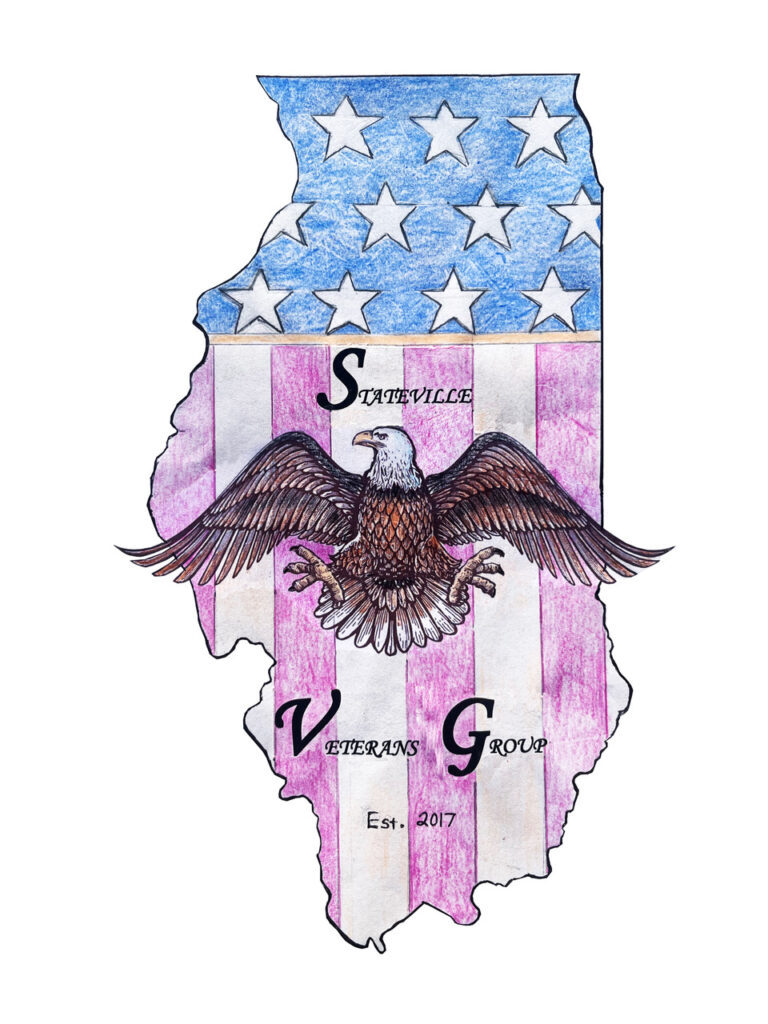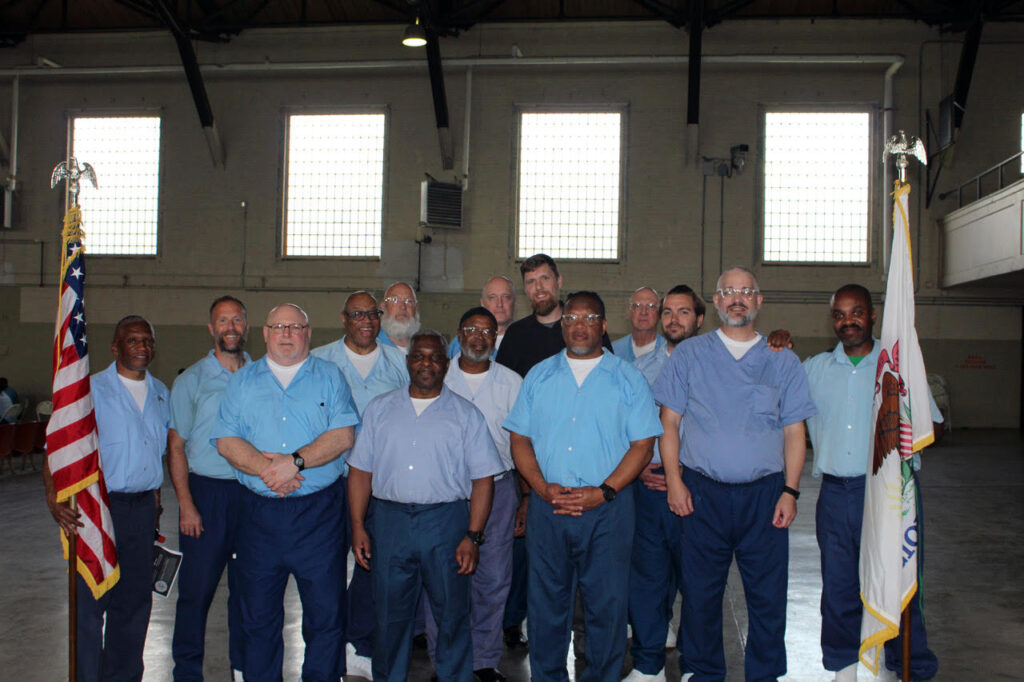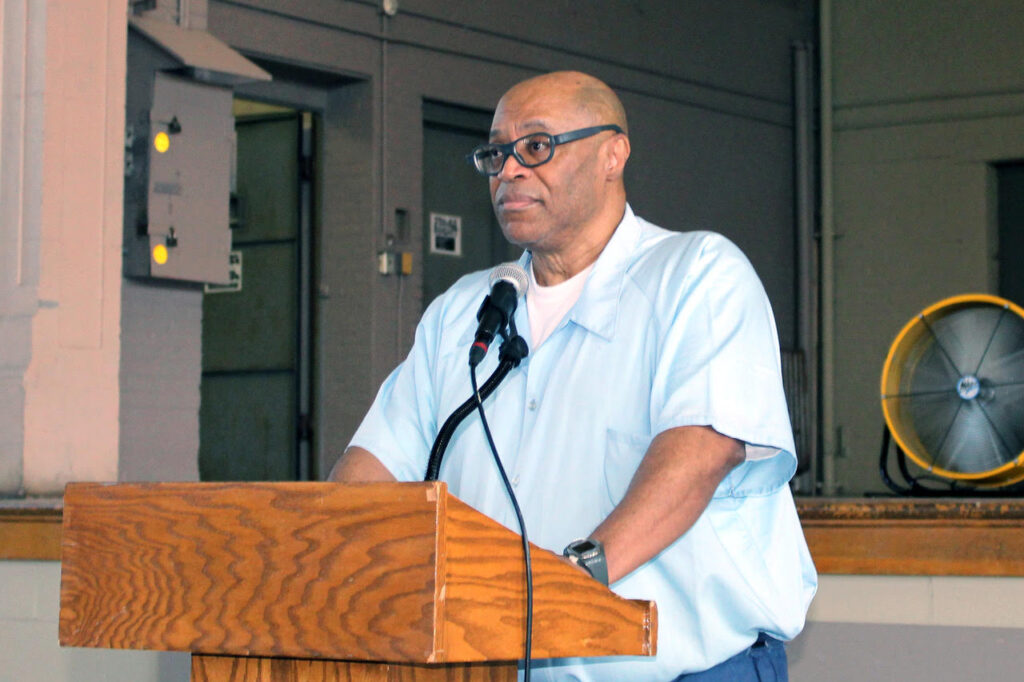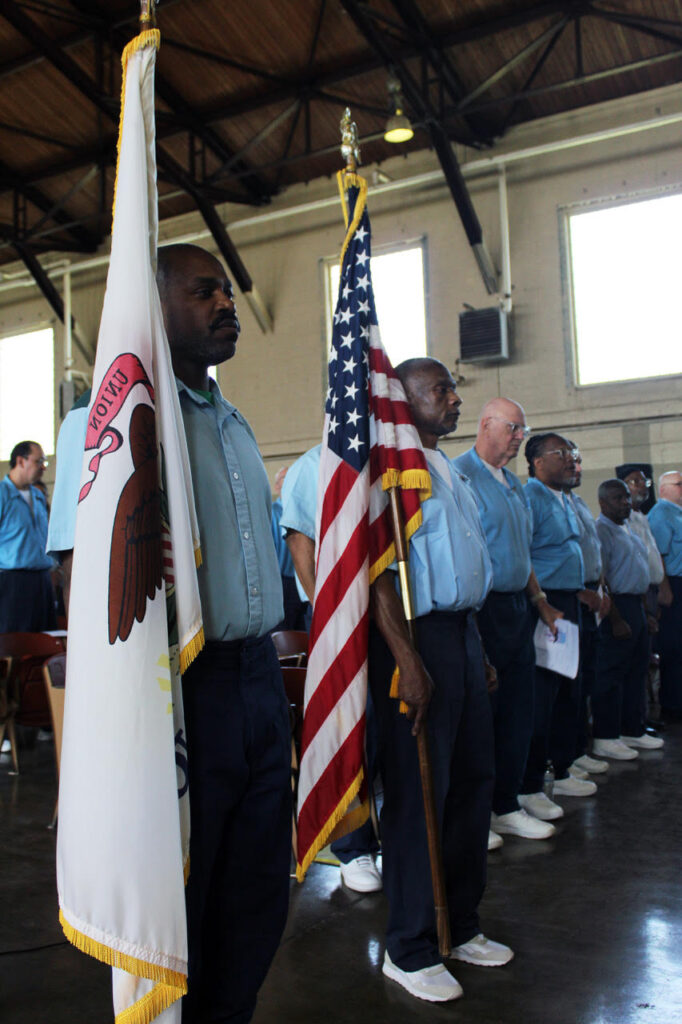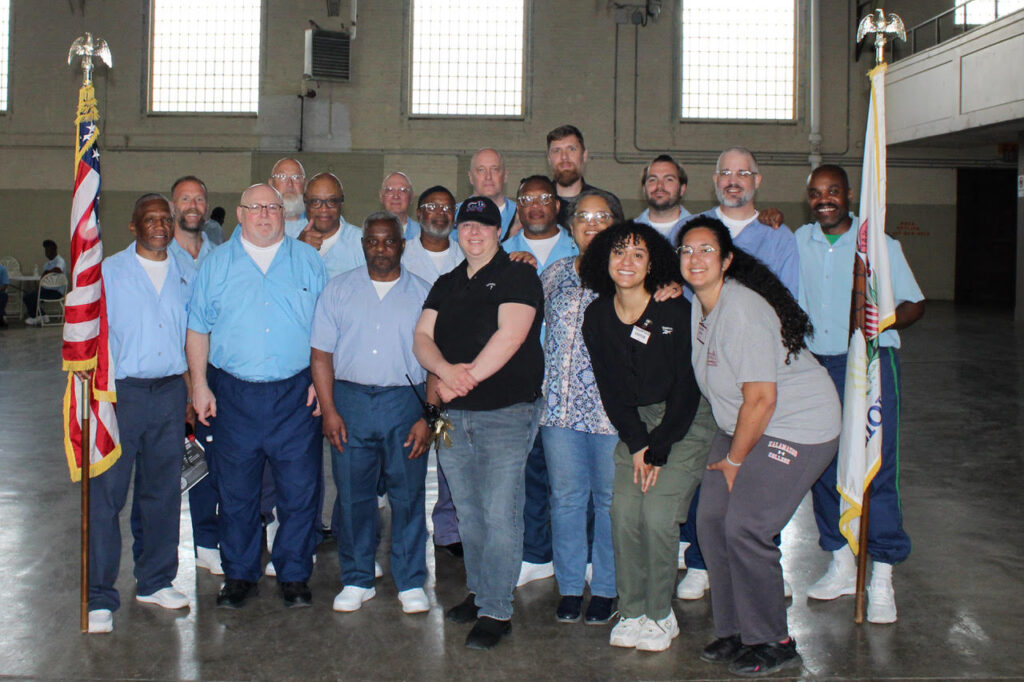
This Veterans Day, Freddie, our Policy Manager at Chicago Votes, reflects on a powerful Memorial Day service she attended earlier this year at the now-closed Stateville Correctional Center. The service, led by incarcerated veterans, honored those who served and sacrificed for our nation. In her reflection, Freddie shares how the experience underscored the meaning of freedom, justice, and the urgent need for an inclusive democracy as we advocate for voting rights through the RACE Act.
In May, I attended a Memorial Day service. About 50 of us sat in an auditorium as the MC began by saying, “Today we remember those who fought the intergenerational fight for freedom and justice.”
The program started with the Star-Spangled Banner, sung live by a trio in perfect harmony, followed by the Posting of Colors and a reverent folding of the flag. By any standard, this could have been a typical Memorial Day service—except that we were inside a prison, Stateville Prison to be exact. Most of the participants were not free to go home afterward because they are individuals in custody. All except for Dr. Christina Rivers from DePaul University, Aaron Hughes from the Prison + Neighborhood Arts/Education Project, Warden Truitt, a CO, and Alex Boutros and me from Chicago Votes.
Aaron Hughes, an Iraq War veteran and member of About Face: Veterans Against the War, organized the event for the veterans. For the past year, he has facilitated meetings for the Stateville Veterans Group, and since 2016, he has taught classes with the Prison + Neighborhood Arts/Education Project at Stateville Prison.
In the theater hall, there is an obvious paradox, a contradiction. The singers’ voices vibrate in perfect harmony, their voices are full and rich but still, the final stanza that reverberates off the walls “the land of the free and the home of the brave” rings hollow. During a moment of silence for fallen military personnel, we bowed our heads.
During the remembrance, we observe a moment of silence for all fallen military personnel, those who lost their life serving their country. They are honored for making the ultimate sacrifice, their lives, for the American ideals of equality, freedom, justice, and democracy. Everyone bowed their heads, someone sighed, and then only the humming of the fan could be heard.
A roll call followed. Veterans stood, saluting as a trumpet blared. Three veterans at the front folded the flag with care, and one held it as though cradling a child before presenting it to Warden Truitt on behalf of all those who made the ultimate sacrifice. The warden exited silently, his keys jingling as he walked down the aisle.
The irony was palpable for everyone. Here we were, in “the land of the free,” inside a prison.
The speakers brought different perspectives. Sgt. John reminded us to remember not only those who died in combat but also veterans who lost battles after returning home—those who died by suicide, addiction, or COVID-19. His grandfather, a WWII veteran, took his life after returning from war. “Remembering is not enough,” he said. “We must help our veterans.”
Warden Truitt reaffirmed his support for the veterans’ group, though its future was uncertain due to the prison’s impending closure.
Scott Parker, a noncombat veteran and fourth-generation Army Reserve, honored his family’s service. He spoke of a family member who was a WWII POW, a Purple Heart recipient who, ironically, became a prisoner in his own country after serving. “Does that mean all of us here are not citizens anymore?” he questioned, addressing the lack of voting rights for incarcerated individuals in Illinois.
Eddie Brown, a Marine Corps veteran, gave a dramatic reading from A Few Good Men. Although Col. Jessup is the villain in the movie, Brown pointed out the irony in Jessup’s monologue, highlighting the state’s role in violence. Just as the military is an institution that trains people for violence, prisons are institutions where individuals are punished for violence. “Should the state not share some of the blame?” he asked. “The right to vote should never be taken away, especially when the government plays a role in the circumstances that lead to incarceration.”
Then came the keynote speaker, Dr. Christina Rivers. A professor of Political Science at DePaul University, Dr. Rivers teaches at Stateville as part of the Inside-Out Program. She founded the Law & Policy Think Tank in 2017, bringing together students from both inside and outside prison, along with organizers from groups like Chicago Votes, which is how I got involved.
As she walked to the podium, everyone rose for a standing ovation—a testament to the respect she gently commands. She began by acknowledging her veteran ancestors. Her uncles fought in the Black Cavalry in WWI, and her father served in the Korean War. Growing up near the Marine Corps Recruit Depot in San Diego, she has an understanding of military life and its history.
In true professor fashion, Dr. Rivers gave us a history lesson. Memorial Day originated in Charleston, South Carolina, where thousands of recently emancipated Black residents honored 237 Union soldiers who had died as prisoners of war. After the 13th, 14th, and 15th Amendments abolished slavery, granted citizenship, and enfranchised formerly enslaved people, Black men were allowed to participate in American political life. During Reconstruction, about 2,000 African American men held political office, despite violent opposition.
Yet, as the South sought to re-establish its economic foundation after the loss of slave labor, the 13th Amendment’s loophole allowing “slavery as punishment for a crime” became a tool for re-enslaving Black people. Black Codes criminalized basic freedoms for Black Americans, creating a pipeline to prisons where they were forced into convict leasing, providing free labor for states and plantations.
Southern states also introduced laws that stripped incarcerated individuals of their voting rights—a tactic to suppress a growing Black electorate. Dr. Rivers closed with a reminder that we are at a similar crossroads now, fighting the same battles for civil rights and justice.
As the ceremony drew to a close, it was clear that honoring those who have served our country is also about upholding the freedoms they fought to protect. This Veterans Day, we remember those who sacrificed for the ideals this nation claims to covet—equality, justice, and democracy— ideals that should be extended to all.
The voices of incarcerated veterans at Stateville echo a call to restore voting rights and create a more inclusive democracy. Nearly every speaker, spoke about the importance of restoring voting rights for people incarcerated and the importance of the work we are doing at Chicago Votes with the Unlock Civics Coalition, to pass the Reintegration and Civic Empowerment (RACE) Act. This critical piece of legislation builds upon the Civics in Prison bill that was Written by individuals incarcerated in Stateville, and passed by the Illinois State Legislature in 2019, created peer taught civics courses that would be taught inside of the Illinois Department of Corrections facilities.
The RACE Act would make these courses available for all individuals in custody, offer sentence credits for peer educators, and restores the right to vote for people currently incarcerated.
Passing the RACE Act would honor their service by recognizing their humanity and their place in our society. This act is not just legislation—it’s a commitment to a democracy that truly represents all Americans, both inside and outside prison walls.
In early September, Stateville began the process of closing and now all the men in the Veterans group have been transferred to different prisons across the state. The future of the veterans group is uncertain, as well as much of the programming like the DePaul Think Tank and academic programs offered by Northwestern, DePaul, and other institutions.
Since I drafted this reflection, the 2024 general election has come and gone, and for the first time ever, the president-elect has something in common with the veterans I sat with in May. He has a felony conviction. Unlike the veterans in Stateville, he will be given the privilege to serve in the highest office in the land while the Illinois Legislature considers if the thousands of incarcerated individuals in our state should even have the right to cast a ballot.
This Veterans Day, Illinois stands at a crossroads with an opportunity to meaningfully address and atone for the legacy of Jim Crow and lead the nation by extending democracy to all of its citizens. In this intergenerational fight for freedom and justice, I hope we will find ourselves on the right side of history.
